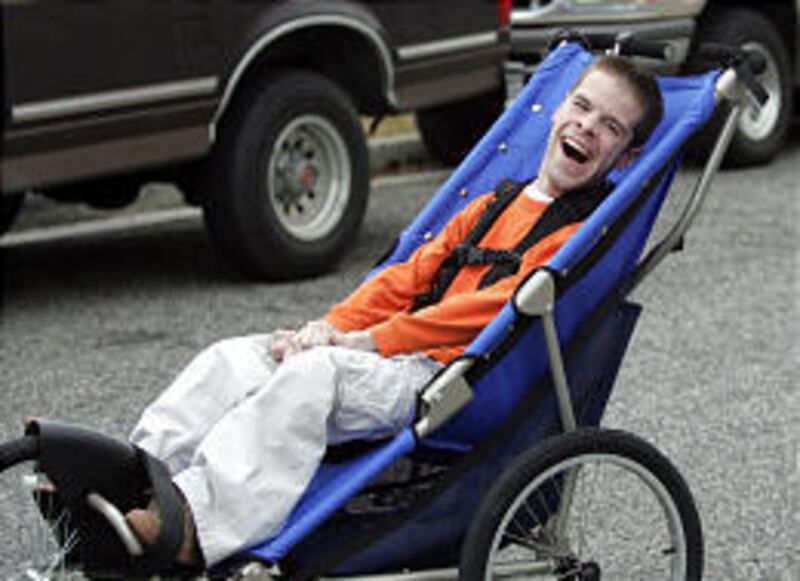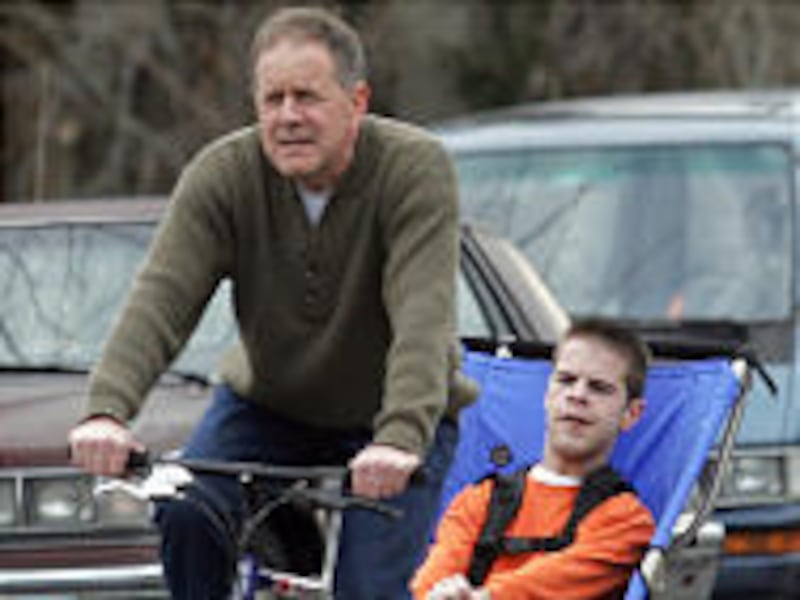SPRINGVILLE — Sam Durst is like most Utah Valley State College students.
He's 22, takes business classes and stays active — skiing, bowling, riding horses and even rappelling
But he's got a leg up on a lot of his fellow students. He already has a product he and his brother are readying for market, thanks to several engineering students at Brigham Young University.
Durst has cerebral palsy, and despite skiing on weekends with his family, he hasn't been able to join in family bike rides for a decade.
Three years ago, the Dursts learned about BYU's Capstone project, part of a senior course each mechanical engineering student must take to graduate. The students work on real products for Ford, Boeing, Thiokol and medical device companies.
They also engage in community-related projects, and in 2002 a team of five students agreed to tackle Durst's request — create a portable bike trailer big enough for him and light enough for his parents, Roger and Christine, to pull him around.
The Dursts also wanted a trailer that could be transformed into a stroller.
"If we go on a ride as a family and decide to go get ice cream or something, we wanted to be able to unhitch it from the bike and push him in (inside the store)," Christine Durst said.
That was a tall order. Nothing like it existed and the first prototype had some problems typical to engineering projects.
Eventually the student team was dismantled, the prototype broke and Sam was left disappointed.
Capstone director and mechanical engineering professor Robert Todd refused to leave him like that, and during the summer of 2003 graduate student James Chatterley, 32, asked former LDS mission companion Kyle Hansen, an MBA student with a mechanical engineering degree, to help him solve the problems with the original prototype.
"Once I met Sam, how could I say no?" Hansen said Friday after he, Chatterley and Todd presented a new, BYU blue prototype to the Dursts.
"Yeah!" Sam yelled to his friends after his father pulled him up and down the street in front of his house.
"We have some friends who are interested in purchasing this," he added with excitement later.
The Dursts call it a Variable Function Transport trailer, and Sam and his brother Nick have a Web site, vftsport.com, where the prototype will be posted this week. The family has been approached by a half-dozen people who want the trailer. They plan to start looking for a manufacturer even as they road test the new prototype.
The second phase of the project cost less than $1,000, Chatterley estimated. The trailer weighs about 32 pounds, is compact, converts to a jogger and hitches — or unhitches — easily from a bike.
Todd said Capstone projects in general teach the students how to be practical engineers. Chatterley said the Durst adult bike project did just that.
"I learned some of the quirks of designing for human factors," he said. "The stereotype of engineers not being good people persons is pretty much true. If engineers build something, it's usually boxy, functional. But I learned when you face a project like this, you have to ask yourself, 'How can I make this work for people?' You want it to be useful, but it needs to be pleasant to sit in and pleasant to push."
BYU will hand the design to the Dursts, who will enjoy putting a lot of wear and tear on the trailer to see how it holds up.
"It's designed to carry a 100-pound person," Chatterley said. "It's very much specifically designed for Sam, so to manufacture it there will be more work to do."
Will they make millions if it works? Maybe not, but that's not the point and doesn't dampen the enthusiasm.
"Mass manufacturers are not interested because the market is so small," Hansen said. "These families are on their own."
The Dursts are quick to point out that assessment isn't entirely true. They say they have a few people-oriented engineers on their side, and while Sam has some difficulty speaking, he didn't have any trouble communicating his joy and appreciation as he yelled and smiled on Friday.
Now he hopes to spread that joy to others like him.
E-mail: twlach@desnews.com



